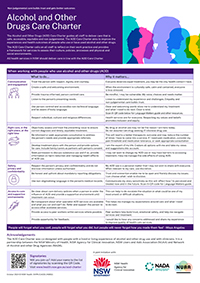
Alcohol and Other Drugs
(AOD) Care Charter
About the AOD Care Charter
The AOD Care Charter guides all staff to deliver care that is safe, accessible, equitable, and non-judgemental. The AOD Care Charter aims to improve the experiences and health outcomes of people who use or have used alcohol and other drugs.
The AOD Care Charter calls on all staff to reflect on their work practice and provides a framework for services to assess their culture, policies, processes and physical and social environments.
All health services in NSW should deliver care in line with the AOD Care Charter.
Key principles of the AOD Care Charter
Find out what to do and why it matters:
Signatories
Acknowledgement of contributions
The AOD Care Charter was co-designed with people with a lived or living experience of alcohol and other drug use and with clinicians. It is a partnership between the NSW Ministry of Health, NSW Agency for Clinical Innovation, NSW Users and AIDS Association (NUAA) and Network of Alcohol and other Drugs Agencies (NADA).
The NSW Ministry of Health would like to acknowledge and thank the Co-Design Working Group who developed the AOD Care Charter and made a major contribution to implementation planning:
- Alice Pierce
- Angela Thornhill
- Angus Mason
- Briallen Lloyd
- Daria Erihe
- Fabian Galbraith
- Francine Campbell
- Grace Ha
- Jennifer Uzabeaga
- Jocasta Fitzpatrick
- Kate Masters
- Kevin Street
- Laura Griffin
- Laura Purcell
- Lucy Pepolim
- Marisa Ronsisvalle
- Mary Ellen Harrod
- Melissa Romeo
- Michael Clark
- Michele Campbell
- Nigel Woudsma
- Pip Morris
- Raewyn Whiting
- Regina Nagy
- Ryan Webster
- Suzie Hudson.
